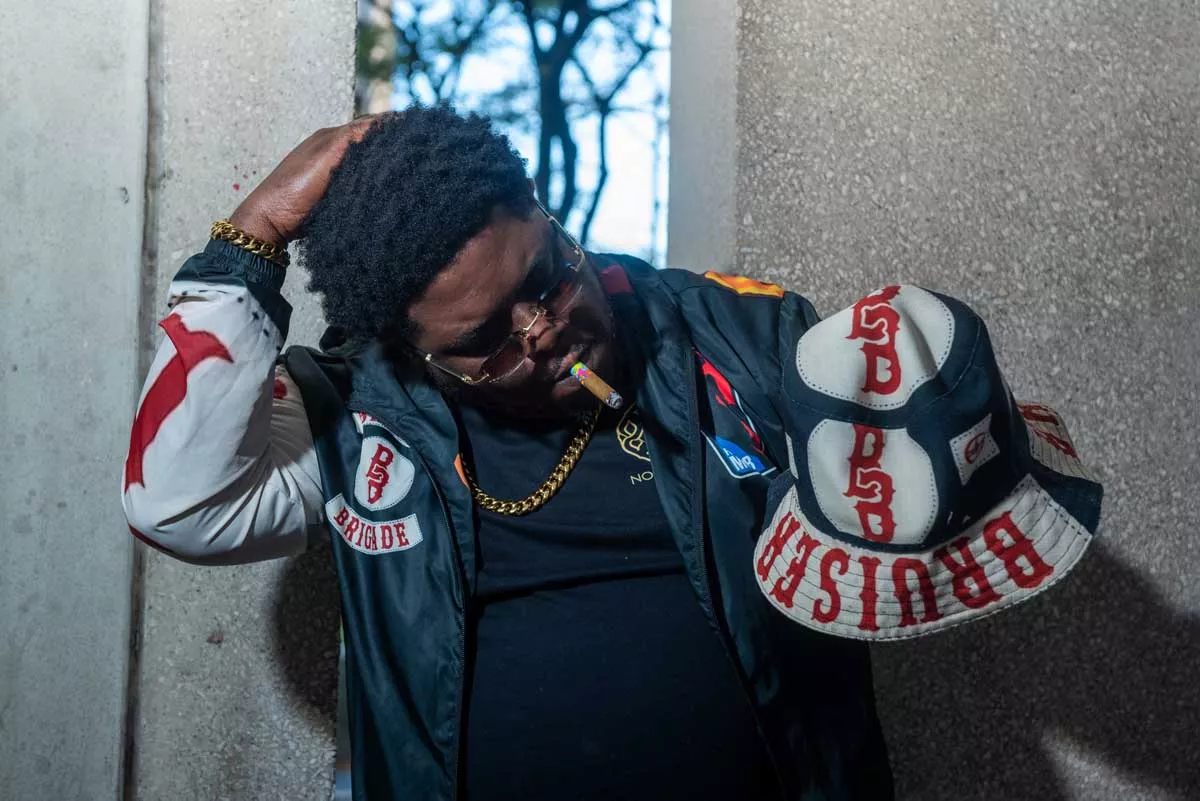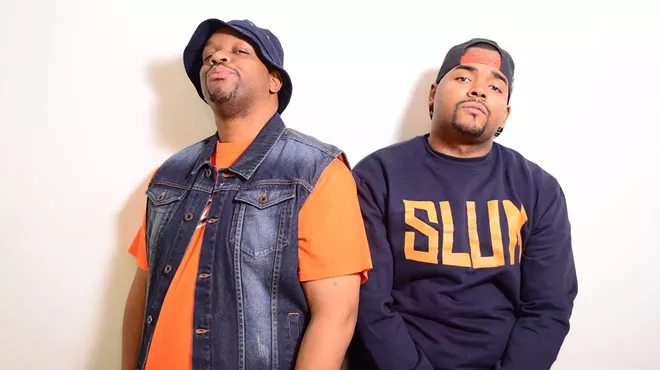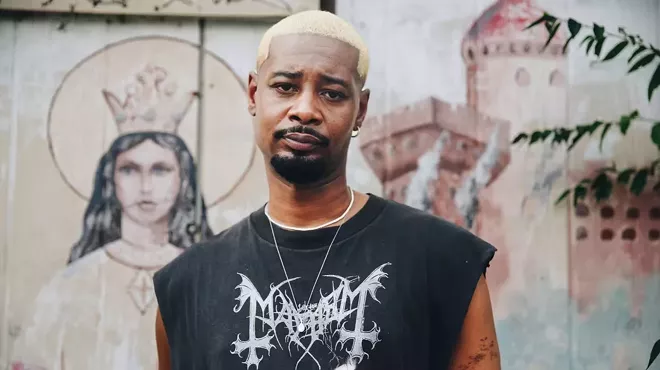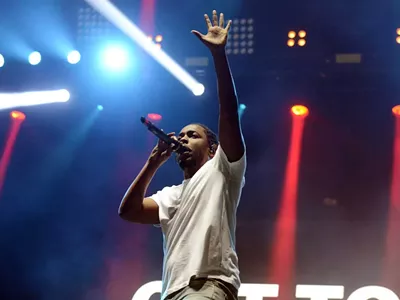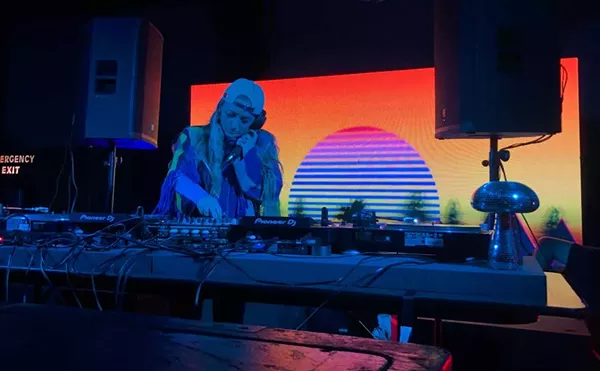Fat Ray is in Detroit’s New Center One building exuding an overwhelming abundance of positive energy. He’s dressed in black jeans and a Bruiser Brigade jacket, with a bucket hat sitting tilted on the back of his head.
“This is a special day,” he says. He pulls out his iPhone and goes straight to a social media post made by friend and fellow emcee Black Milk. The screen shows two audio snippets of a new album by both emcees. This is the first time the public has been made aware of this project and the first time since they’ve collaborated for a full album since 2008’s The Set Up.
“Me and Black Milk — we’re back in there! That’s why today is a special day … we’ve done little things here and there, but this is our first project in years,” he says.
Ray is a proud westside Detroit native and Cass Tech graduate. He was raised by a mother who sang gospel music and a father who was a recording engineer with a home-based studio. “My whole life I’ve been watching my dad write songs in his spare time,” Ray says. “It all just opened up my creativity to wanting to try and mess around with music and see what I could do.”
Much like Black Milk, Ray is a godson of Detroit’s famed Hip-Hop Shop era. It was a time period when fashion designer Maurice Malone sponsored hip-hop battles and showcases at the Rhythm Kitchen and his Hip-Hop Shop clothing store. Ray was too young to participate in the mid-’90s rap battles but old enough to stand outside and witness the greatness through the foggy Hip-Hop Shop window. By the time the Hip-Hop Shop moved to its second location, Ray was able to get behind the mic and make a name for himself.
“That was during the Slum Village era, when they had dropped Fantastic Voyage,” Ray says. “Bugz [from D-12] was still here, Swan and Undertaker were in a group … Proof was here — it was just special.”
By 2003, Ray had become a mainstay at clubs Lush Lounge, Millennium AD, and the Record Exchange, which had become the next generation of hip-hop spots. One night while performing at Lush, an emcee named Young RJ approached him about dropping a verse on B.R. Gunna’s album Dirty District, Vol. 2. Young RJ was not only an emcee but the son of R.J. Rice, founder of Barak Records, which was the label home of Slum Village. “That one feature turned into nine records,” he says. Ray went on to sign a record deal with Barak, work with J Dilla on the song “Stupid,” and contributed on four different Barak releases. The label dissolved before he was able to put out a solo project, but he considers the opportunity a godsend.
“If it wasn’t for Barak, I wouldn’t have survived the music industry,” Ray says. “I would have been gone.”
For the next several years, Ray grinded independently. He released Bananas Vol 1 (2006), The Lunch Room (2010), and contributed to J Dilla’s posthumous Rebirth of Detroit release in 2012.
“I’ve done the things other artists aren’t gonna do,” he says. “I’ve done them hole-in-the-wall venues, I’ve been there in front of them [two-person] crowd shows that other artists aren’t gonna perform at.”
In 2013, Ray built upon a relationship he had with another Detroit all-star in Danny Brown and joined his Bruiser Brigade group. Musically, Ray and Brown had already collaborated on Brown’s 2011 XXX album. “Danny has always been a friend of mine,” Ray says. “We worked together on Elzhi’s project Prequel to a Classic.”
Detroit hip-hop artists ZelooperZ, Quentin Ahmad DaGod, and Bruiser Wolf were also members of Bruiser Brigade, as Brown transitioned the imprint into a full-fledged record label in 2021. Ray has always prided himself on being an emcee’s emcee, so the label’s commitment to authenticity and individuality made it the perfect place for Ray.
“I never cared who bought my music, but I know when a person comes up to me and says, ‘Fat Ray, I’m a fan of your music’ — I know you cut way different because I went outta my way to make sure my music didn’t get in the hands of no suspects,” he says.
In 2021, he released his most critically acclaimed project to date, Santa Barbara. Ray calls it his favorite album, and lyrically he continued to show the lyrical boom-bap aggressiveness and wordplay that has built his fanbase.
“Shooter shit, sink yo’ battleship, plea the fifth/Presidential, flee the whips, eatin’ pita chips/Had to pay Paul, we took Peter shit/Had to play ball, Joe D shit, verbal Bruce Lee and shit,” he raps on “Flight Risk.”
Santa Barbara was one of Brooklyn Vegan’s top 24 independent hip-hop albums of 2021. The album was also added to superstar fashion designer Virgil Abloh’s “Imaginary Radio” Soundcloud page and even received a 5-star review in the Harvard Crimson (the nation’s oldest daily collegiate newspaper). Ray has been riding the wave of the album for two years, and every time he thinks it’s run its course, a tweet or a mention sends the streams back into relevancy.
“Santa Barbara got me a response from people I never expected to talk to,” he says. “I was getting ready to put out another tape and it started going up again. And in the major scheme of things, a lot of people still haven’t heard it. The way I see it, at all times I’m always a new artist.”
Ray has been able to maintain his staying power by staying true to his boom-bap rawness. He’s old school but doesn’t close himself off to new techniques and flavors. He’s a proud wordsmith who still takes pen to pad but isn’t afraid to incorporate the punch-in method like many newer artists.
“I didn’t respect it until I got around Damedot and Cashout Calhoun,” Ray says. “It’s a method to it — it ain’t just hitting a thousand punches. It’s knowing where you left off at, knowing how to transition to the next place, just being a master of them and being clever and witty on the spot.”
As exultant and imposing as Ray’s music and career has been, his biggest flex is that he’s one of few people that can say he’s worked directly with Big Proof, J Dilla, and Danny Brown as both a peer and a mentee.
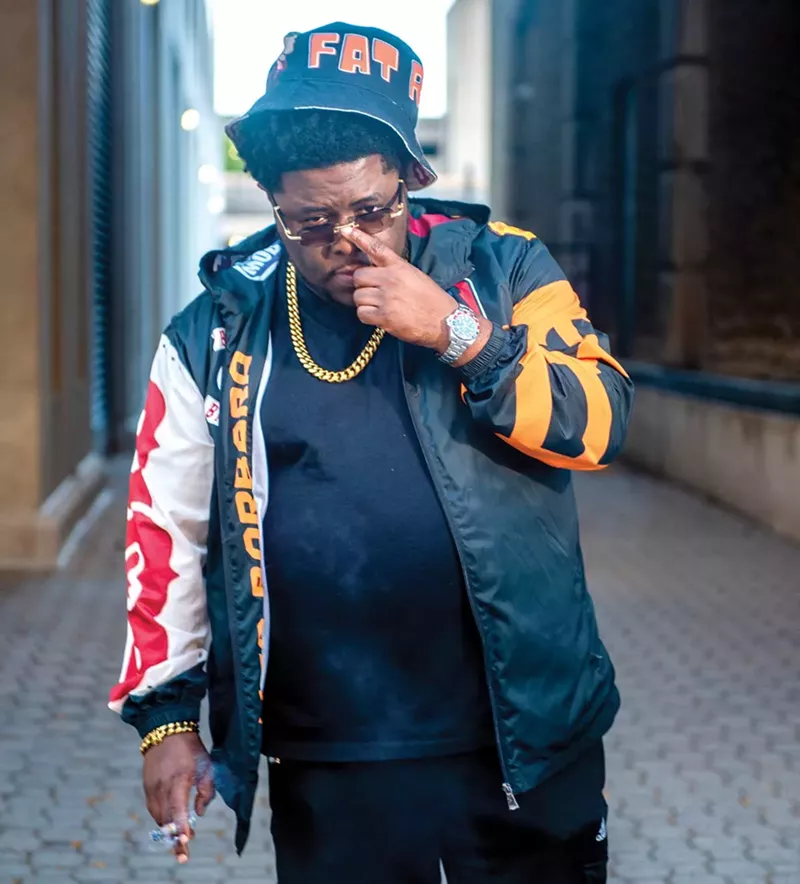
He credits Proof with being one of the first people to believe in his talent.
“Proof came and grabbed me, snatched me out the Hip-Hop Shop like, ‘This nigga with me,’” he says.
Ray got to witness Dilla’s work ethic, professionalism, and craftsmanship firsthand while Danny Brown showed him the importance of individuality.
“Danny showed me how to be [myself], how to not care what everyone thinks. How to be creative beyond measure and how to trendset, and to have ideas good enough to be the first one to do them.”
Fat Ray and Black Milk’s album is titled Food From the Gods and it’s currently slated to drop later this month. Ray feels it’s some of his best work, and he’s excited for his fans to hear it. The project serves as a personal reminder that he’s getting better with time. And he scoffs at the notion that he should stop rapping simply because he’s getting older.
“Rapping is our thing,” he says. “We’re the ones who created it — y’all should come up with something new. Hip-hop is something that belongs to me, and the way that it comes out of certain people — you don’t get to dictate what that is. It’s organic to who the beholder is.”

